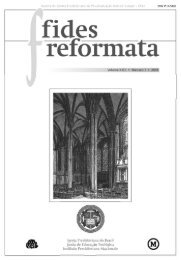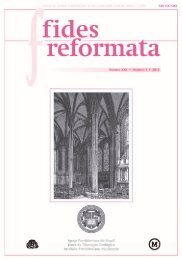Fides 22 N2
Um publicação do Centro Presbiteriano de Pós-graduação Andrew Jumper.
Um publicação do Centro Presbiteriano de Pós-graduação Andrew Jumper.
You also want an ePaper? Increase the reach of your titles
YUMPU automatically turns print PDFs into web optimized ePapers that Google loves.
FIDES REFORMATA XXII, Nº 2 (2017): 139-162<br />
The reformers’ understanding of eschatology and its implications for the<br />
preaching of the gospel worldwide was correct. Since the time of the apostles<br />
the work of expansion of the true Christian faith had been related to the work<br />
of the Holy Spirit. The reformers did not idly wait for a might work of the Spirit<br />
but actively engaged in preaching and spreading the true gospel throughout<br />
Europe and, when the doors were opened, beyond Europe.<br />
Warneck and Latourette clearly believe that the work ought first to be<br />
doctrinally established before attempting work among the heathen. Their definition<br />
of heathen, however, does not correspond to the biblical definition and<br />
description of such groups. Besides, Warneck (and Latourette) later report in<br />
their works that the rapid spread of the gospel among all the nations did not<br />
take place until the first Evangelical Awakening, which took place among those<br />
of Calvinist tradition. Unfortunately neither historian went back to correct his<br />
critique of the sixteenth-century reformers. At the end, the reformers were<br />
correct in their interpretation of the Scriptures, and in their perseverant waiting<br />
for the day when doors would be opened wide for the preaching of the gospel.<br />
Consider the following findings issued by both Warneck and Latourette.<br />
Warneck wrote that “there must first come a religious revival to make<br />
the dead bones live, and this revival came – one of the greatest and most<br />
permanent known in Christian church history.” 34 This awakening took place<br />
during the eighteenth century, and especially through Calvinist preachers like<br />
George Whitefield and Jonathan Edwards. When writing on “the present age<br />
of missions,” Warneck understood that “the new spiritual revival quickened<br />
evangelical Christendom to the understanding of the missionary signal, which<br />
God gave in a series of historic events by which He opened the doors of the<br />
world.” 35 Warneck missed the reformers’ eschatological prediction. The reformers<br />
understood that such revival would come and that until then they would<br />
continue to preach the gospel wherever they were and whenever doors were<br />
opened. Revival would not quicken the “understanding of the missionary<br />
signal,” but would boost the evangelization of the world – a desire already<br />
expressed and taught by the reformers.<br />
The reformers rightly taught that God is the One who works through<br />
his servants, but in His time. He rules over every event. Warneck says, “Independently<br />
of the religious revival, events happened which drew attention<br />
to the non-Christian world,” but he overlooks the fact that at the time of the<br />
Reformation the reformers were already alerted toward such events as well.<br />
Warneck continues his thesis by declaring that “Through the conjunction<br />
of these events with the spiritual awakening, which was a clear evidence of<br />
the Divine leading, the Holy Ghost recalled the almost forgotten missionary<br />
34 Warneck, Outline of a History, 70.<br />
35 Ibid., 74.<br />
147




